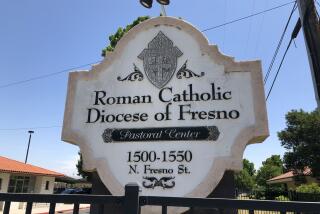Carrying Out New Policy Will Put Bishops to the Test
- Share via
DALLAS — To hear the bishops talk, sexually abusive priests can expect knocks on their door as soon as their bishops get home Monday.
“This is a profound step in a long and sorrowful journey,” Bishop Wilton D. Gregory, president of the Roman Catholic bishops conference, said after Friday’s 239-13 vote on the first national policy to discipline priests who abuse minors.
But Gregory was quick to add a caveat. “Our action today is not a panacea. The charter is not perfect.”
Indeed, while the bishops stood up and applauded themselves for an undeniably historic vote, they know better than anyone that the real work lies ahead. They laid down the rules of the game, but winning it will be no slam-dunk.
There are committees to put in place to carry out the plan on a national level. Local bishops who haven’t done so already will have to update their sexual abuse prevention policies so they conform to the standards approved here Friday. And, the Vatican must still approve changes in church law to throw the weight of canon law behind the U.S. bishops’ good intentions.
The plain fact is, despite the bishops’ insistence that the plan is “mandatory,” a rogue bishop could ignore the whole thing if he wanted. That, however, is unlikely for several reasons.
First, by voting for the compact, bishops are honor bound to make good on their pledges to one another.
Secondly, new national bodies to be created by the bishops, including an Office for Child and Youth Protection, will help local bishops strengthen their sexual abuse prevention policies--and closely monitor their progress. It will issue an annual public report.
The bishops’ compliance also will depend on the continued vigilance of the news media and of victim abuse support groups that for decades have dogged the church hierarchy.
There was added incentive for compliance announced Friday: the appointment of Gov. Frank Keating, a no-nonsense former FBI agent, as chairman of the new national Office for Child and Youth Protection.
Keating wasted no time in telling reporters that he will not only see to it that bishops are in hot pursuit of molesting priests, but that bishops themselves may become his target.
He pledged that if he finds any bishop--past, present or future--who has covered up a priest’s crime of sexually abusing a minor, he will report the matter to Pope John Paul II.
The plan approved Friday is the toughest ever adopted by U.S. bishops. But local bishops will retain a certain amount of discretion in carrying it out. For example, while it calls upon bishops to always forward reports of abuse to civil authorities, it leaves it up to the bishop how to follow through.
If bishops follow their plan, there will be no choice but to permanently remove any priest found to have sexually abused a child at any time--past, present or future. Priests will be forbidden to wear their Roman collars and other priestly garb. They will be barred from publicly celebrating Mass, the central act of Catholic worship. They would not be able to even pose as a priest even though, theologically, they remain a priest forever.
The compact also gives bishops discretion on whether to go beyond the removal of a priest from public ministry to seeking the ultimate penalty--ouster from the priesthood. This was a compromise: An early draft of the compact would have made it mandatory to seek a priest’s removal in all cases.
As the plan unfolds, it will be closely watched in the next two years as the church works out the bugs, refines legal definitions and, hopefully, wins Vatican approval to cast what is essentially voluntary compliance into the hard rock of legal stone.
But, the bishops think they have already accomplished much since the sexual abuse scandal--which has persisted for decades--flared anew this year with reports that priests had been transferred from parish to parish as they continued their molestation of minors.
In that sense, perhaps the prayers raised by the bishops Friday morning before the debate and vote may have been answered, at least in part.
In those early morning moments, the litany of dark headlines of priestly sexual abuse and cover-ups by bishops fell before an ancient litany of confession.
The bishops prayed for a humble and contrite heart. They asked to be washed of their guilt and cleansed from their sin.
“My sin is always before me,” they said in unison, a hoary prayer as current as the morning headlines. “What is evil in your sight I have done.... Wash me and I shall be whiter than snow.”
On this day, their actions were to speak louder than their words. Their petitions to heaven were borne not on prayers alone, but by votes.
More to Read
Sign up for Essential California
The most important California stories and recommendations in your inbox every morning.
You may occasionally receive promotional content from the Los Angeles Times.










